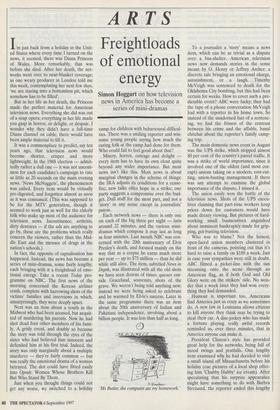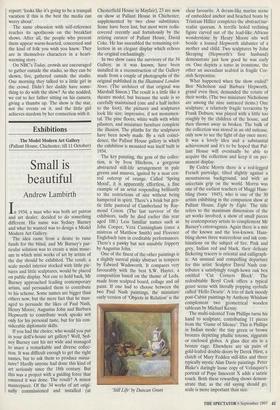ARTS
Freightloads of emotional energy
Simon Hoggart on how television news in America has become a series of mini-dramas I'm just back from a holiday in the Unit- ed States where every time I turned on the news, it seemed, there was Diana Princess of Wales. More remarkably, that was before she died. After her death, the net- works went over to near-blanket coverage; as one weary producer in London told me this week, contemplating her next few days, `we are staring into a bottomless pit, which somehow has to be filled'.
But in her life as her death, the Princess made the perfect material for American television news. Everything she did was out of a soap opera; everything in her life made you gasp in horror, or delight, or despair. I wonder why they didn't have a full-time Diana channel on cable; there would have been ample material to fill it.
It was a commonplace to predict, say ten years ago, that television news would become shorter, crisper and more lightweight. In the 1988 election — admit- tedly rather a dull one — it was not uncom- mon for each candidate's campaign to rate as little as 20 seconds on the main evening news. 'News McNuggets', the phenomenon was called. Every item would be virtually pre-digested, and forgotten almost as soon as it was consumed. (This was supposed to be for the MTV generation, though it seemed to work just as well for the elderly folk who make up most of the audience for television news. Incontinence, arthritis, dirty dentures — if the ads are anything to go by, these are the problems which really concern the viewers, rather than the Mid- dle East and the menace of drugs in the nation's schools.) In fact, the opposite of capsulisation has happened. Instead, the news has become a series of mini-dramas, some fairly lengthy, each bringing with it a freightload of emo- tional energy. Take a recent Today pro- gramme on NBC. The first news of the morning concerned the Korean airliner crash, complete with harrowing shots of the victims' families and interviews in which, unsurprisingly, they were deeply upset.
Next was an item about a youth in the Midwest who had been accused, but acquit- ted of murdering his parents. Now he had shot dead four other members of his fami- ly. A grisly event, and doubly so because the story was told through the eyes of the sister who had believed him innocent and defended him at his first trial. Indeed, the story was only marginally about a multiple murderer — they're fairly common — but was really the emotional drama of a woman betrayed. The slot could have fitted easily into Oprah: Women Whose Brothers Kill But Who Stand By Them.
Just when you thought things could not get any worse, we switched to a holiday camp for children with behavioural difficul- ties. There was a smiling reporter and win- some young people saying how much the caring folk at the camp had done for them. Who could fail to feel good about that?
Misery, horror, outrage and delight every item has to have its own clout quite beyond any wider importance. But most news isn't like this. Most news is about marginal changes in the scheme of things: the IRA adjusts its conditions for a cease- fire; new talks offer hope in a strike; one party suggests a compromise over the bud- get. Dull stuff for the most part, and not a `story' in any sense except in journalists' patois.
Each network news — there is only one on each of the big three per night — lasts around 22 minutes, and the various mini- dramas which compose it may last as long as four minutes. Last month NBC was con- cerned with the 20th anniversary of Elvis Presley's death, and focused mainly on the way that as a corpse he earns much more per year — up to $75 million — than he did while still alive. The item, subtitled News in Depth, was illustrated with all the old shots we have seen dozens of times: queues out- side Graceland, souvenirs, shots of the grave. We weren't being told anything new; instead we were being asked to celebrate and be warmed by Elvis's success. Later in the same programme there was an item about the 50th anniversary of Indian and Pakistani independence, involving about a billion people. It was less than half as long.
Ms Butler, the computer ate my homework.' To a journalist a 'story' means a news item, which can be as trivial as a dispute over a bus-shelter. American television news now demands stories in the sense meant by 0. Henry or Jeffrey Archer: a discrete tale bringing an emotional charge, astonishment, or a laugh. Timothy McVeigh was sentenced to death for the Oklahoma City bombing, but this had been certain for weeks. How to cover such a pre- dictable event? ABC were lucky; they had the tape of a phone conversation McVeigh had with a reporter in his home town. So instead of the unadorned fact of a sentenc- ing, we had the frisson of the contrast between his crime and the affable, banal chitchat about the reporter's family camp- ing trip.
The main domestic news event in August was the UPS strike, which stopped almost 80 per cent of the country's parcel traffic. It was a strike of world importance, since it involved one of the oldest (and most cor- rupt) unions taking on a modern, cost-cut- ting, union-busting management. If there was any attempt to examine the global importance of the dispute, I missed it.
The union easily won the battle of the television news. Shots of the UPS execu- tives claiming that part-time workers keep prices down for customers would have made dreary viewing. But pictures of hard- working small businessmen anguished about imminent bankruptcy made for grip- ping, gut-busting television.
Who was to blame? Not the honest, open-faced union members clustered in front of the cameras, pointing out that it's hard to raise a family on $180 a week. Just in case your sympathies were still in doubt, ABC filmed a picket-line with the sun streaming onto the scene through an American flag, as if both God and Old Glory were on the strikers' side. No won- der that a week later they had won every- thing they had demanded.
Humour is important too. Americans find America just as crazy as we sometimes do. A new law in Louisiana allows citizens to kill anyone they think may be trying to steal their car. A disc-jockey who has made a fortune playing really awful records reminded us, over three minutes, that in America anyone can make it.
President Clinton's style has provided great help for the networks, being full of mood swings and pratfalls. One lengthy item examined why he had decided to visit a small island off Massachusetts before his holiday (cue pictures of a local shop offer- ing him 'Chubby Hubby' ice cream). After speculating that his surprise appearance might have something to do with Barbra Streisand, the reporter ended this lengthy report: 'looks like it's going to be a tranquil vacation if this is the best the media can worry about'.
The same obsession with self-reference reaches its apotheosis on the breakfast shows. After all, the people who present them appear warm-hearted, concerned and the kind of folk you wish you knew. They are in themselves characters in a heart- warming story.
On NBC's Today, crowds are encouraged to gather outside the studio, so they can be shown, live, gathered outside the studio. One morning they talked to a little girl in the crowd. Didn't her daddy have some- thing to do with the show? As she nodded, we cut to her father sitting on his camera, giving a thumbs up. The show is the star, not the events on it, and the little girl achieves stardom by her connection with it.



























































 Previous page
Previous page